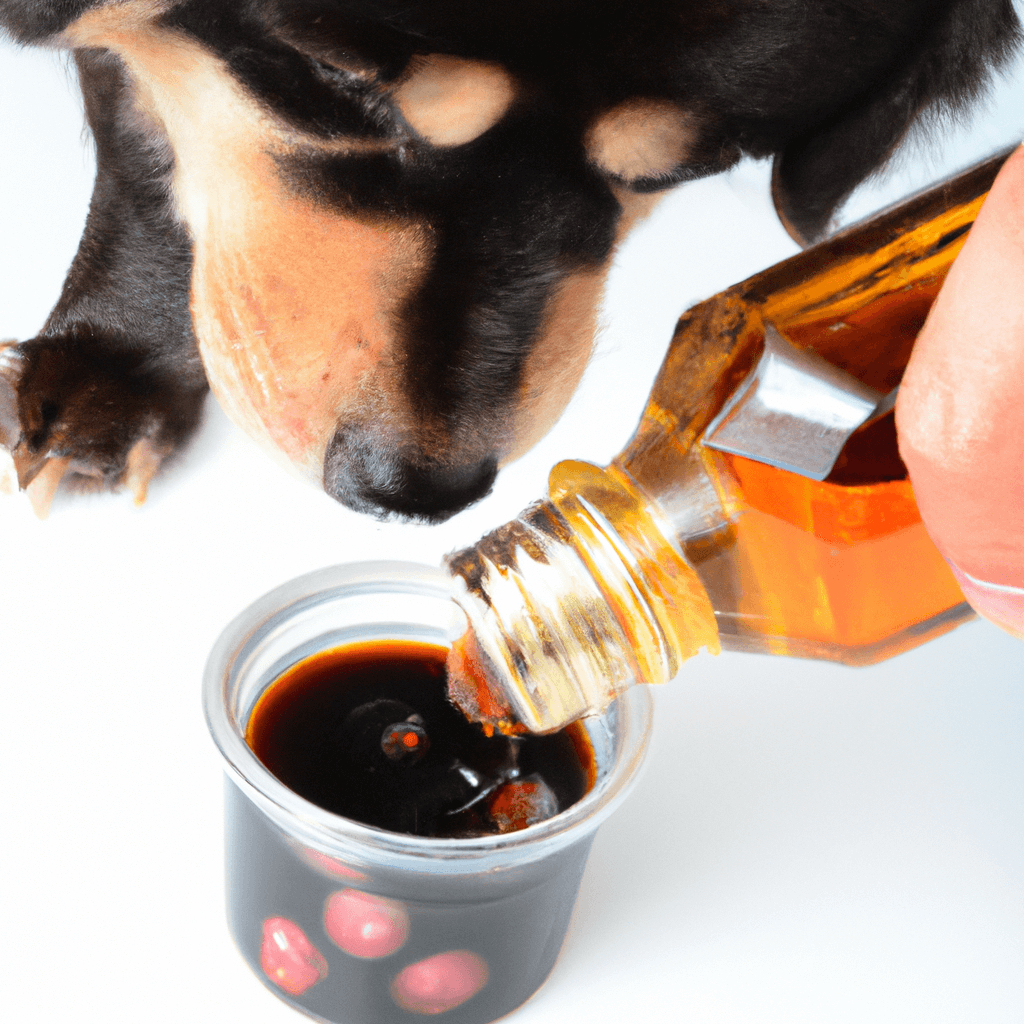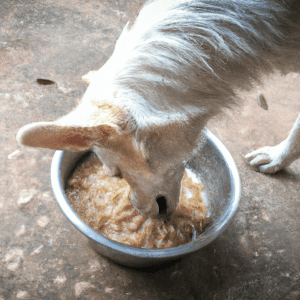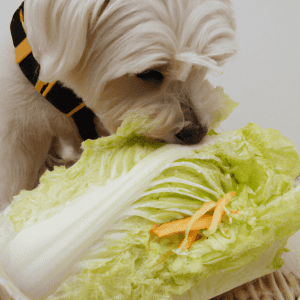Dogs are often known to be picky eaters, but can they eat balsamic vinegar? Balsamic vinegar is a popular ingredient used in many recipes, and it’s made from grapes that have been cooked and aged for a long time. While it has a distinct flavor, some people may wonder if it is safe for their pet to consume.
This article will provide an overview of the health benefits and risks of feeding balsamic vinegar to your dog. Additionally, it will suggest alternative ways to offer your dog the flavors of balsamic vinegar without compromising their health.
Is Balsamic Vinegar Safe for Your Dog?
Balsamic vinegar is a popular ingredient used in many recipes, but you may be wondering if it’s safe for your pup. The good news is that balsamic vinegar is generally safe for dogs when consumed in small amounts. Balsamic vinegar is made from grape must and aged in wooden barrels, which gives it its distinct flavor. The vinegar is usually aged for several years and is usually used as a dressing or as a marinade.
Dogs can consume a small amount of balsamic vinegar, but it should not be given as a meal replacement or on a daily basis. It’s important to remember that balsamic vinegar is high in sodium, so it should not be given to dogs with kidney disease or high blood pressure. Moreover, balsamic vinegar can cause digestive issues in some dogs, so it’s best to consult with a vet before giving it to your pup. Overall, balsamic vinegar is generally safe for dogs when consumed in small amounts.
However, it’s important to remember that it should not be given as a meal replacement or on a daily basis, and it should be avoided if your dog has kidney disease or high blood pressure. If you’re not sure if it’s safe for your pup, it’s best to consult with a vet before giving it to your pup.
What Are the Health Benefits of Balsamic Vinegar for Dogs?
Balsamic vinegar is a great addition to your pup’s diet! Not only is it full of flavor, but it also has many health benefits. Here are a few reasons why you should include balsamic vinegar in your pup’s diet:
- Balsamic vinegar is a great source of antioxidants. Antioxidants help protect your pup’s cells from damage, improve their immune system, and help them stay healthy.
- Balsamic vinegar can help reduce inflammation in your pup’s body. Inflammation can cause pain and discomfort, so reducing it can help your pup feel better.
- Balsamic vinegar can help improve your pup’s digestion. It helps break down food and absorb nutrients more efficiently.
- Balsamic vinegar can help reduce bad breath in dogs. Adding it to your pup’s diet can help freshen up their breath.
- Balsamic vinegar can help fight off bacterial and fungal infections. Balsamic vinegar has antibacterial and antifungal properties, which can help protect your pup from infections. So, as you can see, balsamic vinegar is a great addition to your pup’s diet. It’s full of flavor, and it has many health benefits. Make sure to include it in your pup’s meals to give them all the health benefits it provides!
The Risks of Feeding Balsamic Vinegar to Dogs
Hey there, pet owners! We know you want to give your pup the best, and that includes making sure they get tasty treats! But have you ever thought about adding balsamic vinegar to your diet? While it may sound like a delicious topping for their kibble, balsamic vinegar can be dangerous for your pup. First off, balsamic vinegar contains a lot of sugar. This is bad news for dogs because too much sugar can lead to obesity, diabetes, and other health issues.
Even if you’re only giving your dog a small amount of balsamic vinegar, it’s best to avoid giving it to them altogether. Another risk of feeding your dog balsamic vinegar is that it can cause stomach upset. Balsamic vinegar is very acidic and can irritate your pup’s stomach, leading to vomiting and diarrhea. If your dog has a sensitive stomach, balsamic vinegar may be even more problematic and can cause even more digestive issues. Finally, balsamic vinegar can also be toxic for dogs.
The high levels of acidity in balsamic vinegar can cause damage to your pup’s kidneys and liver. In extreme cases, it can even be fatal. So, when it comes to balsamic vinegar, it’s best to keep it away from your pup. While it may sound tempting to add it to their meals, the risks far outweigh the potential benefits. To keep your pup safe and healthy, stick to dog-safe treats and leave the balsamic vinegar for human consumption only.
What Foods Should Be Avoided When Giving Balsamic Vinegar to Dogs?
When giving balsamic vinegar to your dog, there are a few foods you should avoid. These include foods that are high in sugar, such as honey, artificial sweeteners, and processed foods. Additionally, you should avoid giving your dog any type of processed meats, such as bacon, ham, and sausages. It’s also important to stay away from foods that are high in fat, such as fried foods, butter, and oils. Finally, you should avoid giving your dog any type of raw or undercooked meat, as this can cause serious health problems.
Can Dogs Benefit From Eating Balsamic Vinegar?
No, dogs should not eat balsamic vinegar. While balsamic vinegar is a great ingredient to add flavor to your meals, it can be dangerous for your pup. Balsamic vinegar is very acidic, and it can cause digestive problems if consumed in large quantities. Additionally, balsamic vinegar contains sugar, which can lead to weight gain and other health issues. If your pup happens to ingest some, it’s best to watch out for signs of stomach upset, such as vomiting or diarrhea. If your pup shows any of these symptoms, contact your vet immediately.
How to Make Homemade Balsamic Vinegar Treats for Dogs
Making homemade treats for your pup is a great way to show them how much you care! And if you’re looking for something a little more unique, why not whip up some delicious balsamic vinegar treats? Not only are they tasty for your pup, but they’re also packed with lots of health benefits. Here’s how to make them:
- Gather Your Ingredients You’ll need: – 2 cups of all-purpose flour – 1/2 cup of oats – 1/2 cup of balsamic vinegar – 1/2 cup of water – 1 egg – 2 tablespoons of olive oil
- Mix It All Together In a large bowl, whisk together the flour, oats, balsamic vinegar, water, egg, and olive oil. Mix until everything is well-combined and you have a thick dough.
- Roll Out the Dough On a lightly floured surface, roll out the dough until it’s about 1/4 inch thick. Use a cookie cutter to cut out the desired shapes for your treats (you can also use a knife to cut out squares or other shapes).
- Bake the Treats Place the treats on a parchment-lined baking sheet and bake at 350°F for about 20 minutes. Let the treats cool before serving them to your pup. And that’s it! Your pup is sure to love these tasty and healthy homemade balsamic vinegar treats. Enjoy!
The Best Ways to Introduce Balsamic Vinegar to Your Dog’s Diet
Introducing balsamic vinegar to your dog’s diet can be a great way to add a variety of nutrients to their meals. Balsamic vinegar is full of antioxidants and minerals like iron, calcium, and magnesium. It can even help boost their immune system and improve their digestion. Plus, it’s great for their coat and skin! If you’re interested in adding balsamic vinegar to your pup’s diet, here are some tips to get you started:
- Start off slow. Introduce balsamic vinegar to your pup’s diet gradually. Start by adding a few drops to their food once a day and gradually increase the amount.
- Choose wisely. Make sure you choose good quality balsamic vinegar. Look for one that is aged for at least 12 years to get the most health benefits.
- Stick to recommended amounts. When adding balsamic vinegar to your pup’s diet, it’s important to stick to the recommended amounts. For dogs, the recommended amount is 1-2 teaspoons per day.
- Add it to their food. Balsamic vinegar can be added to your pup’s food or given directly as a treat. If you choose to add it to their food, make sure you mix it well so that it’s evenly distributed.
- Keep an eye out for reactions. Always monitor your pup for any reactions to the balsamic vinegar. If you notice any negative reactions, discontinue use and consult your vet. Adding balsamic vinegar to your pup’s diet can be a great way to give them a boost of antioxidants and other essential nutrients. Just make sure you follow the tips above and monitor your pup for any reactions.
What Are the Side Effects of Feeding Balsamic Vinegar to Dogs?
Feeding balsamic vinegar to dogs can have some side effects, so it’s important to keep an eye on your pup when giving them this type of vinegar. The most common side effect of balsamic vinegar is an upset stomach. Balsamic vinegar is high in acidity and can be difficult for some dogs to digest. If your dog has a sensitive stomach, it may experience vomiting, diarrhea, or abdominal pain. Another potential side effect of balsamic vinegar is dehydration.
Since balsamic vinegar is high in acidity, it can increase thirst and cause your pup to drink more water than usual. In some cases, this can lead to dehydration, so it’s important to make sure your pup has plenty of fresh, clean water available. Finally, balsamic vinegar can cause an allergic reaction in some dogs.
If your pup has an allergic reaction to balsamic vinegar, it may experience hives, swelling, or difficulty breathing. It’s important to watch for any signs or symptoms of an allergic reaction and seek veterinary care if necessary. Overall, balsamic vinegar can be a safe treat for dogs in moderation. However, it’s important to monitor your pup for any potential side effects and seek veterinary attention if necessary.
How Much Balsamic Vinegar Is Safe for Dogs?
It’s generally safe for dogs to consume small amounts of balsamic vinegar. However, since balsamic vinegar is acidic, it could potentially irritate a dog’s stomach, so it’s best to give it to them in small amounts. Start by adding just a few drops to their food and see how they react. If they don’t have any negative reactions, you can increase the amount slowly over time. Avoid giving balsamic vinegar to puppies or dogs with sensitive stomachs, as they may be more prone to having an adverse reaction.
What Are the Alternatives to Balsamic Vinegar for Dogs?
When it comes to adding a little bit of flavor to your pup’s meals, balsamic vinegar can be a great option. However, if you are looking for alternatives to balsamic vinegar, there are plenty of options available. Here are just a few of the alternatives that you can try: Apple Cider Vinegar – Apple cider vinegar is a great alternative to balsamic vinegar, as it also has a sweet and sour flavor that is sure to be a hit with your pup. It also has numerous health benefits, such as helping to reduce inflammation and improve digestion.
Coconut Vinegar – Coconut vinegar is made from fermented coconut water and has a sweet and sour flavor. It is rich in vitamins and minerals, and it can help to improve your pup’s digestion and help to regulate their blood sugar levels. Honey – Honey is another great alternative to balsamic vinegar, as it has a sweet flavor that your pup will love. It is also rich in antioxidants, which can help to boost your pup’s immune system.
Olive Oil – Olive oil is a great option for adding a bit of flavor and moisture to your pup’s meals. It is also a good source of healthy fats and vitamins, which can help to keep your pup’s coat and skin healthy. These are just a few of the alternatives to balsamic vinegar that you can try. You can also experiment with different flavors and combinations to find the perfect flavor for your pup.
In conclusion, balsamic vinegar is safe for dogs to eat in small amounts. However, it is important to note that balsamic vinegar should not substitute for a balanced diet and should be given as an occasional treat. Dogs should not be given large amounts of balsamic vinegar as it could lead to stomach upset and other health issues. It is always important to consult your veterinarian before adding any new food to your dog’s diet.




